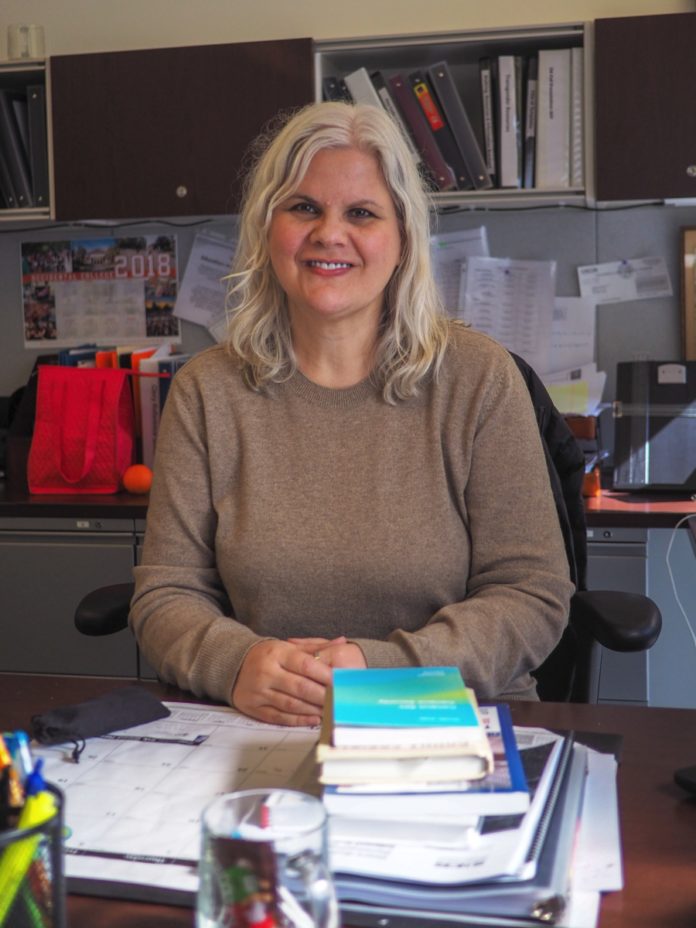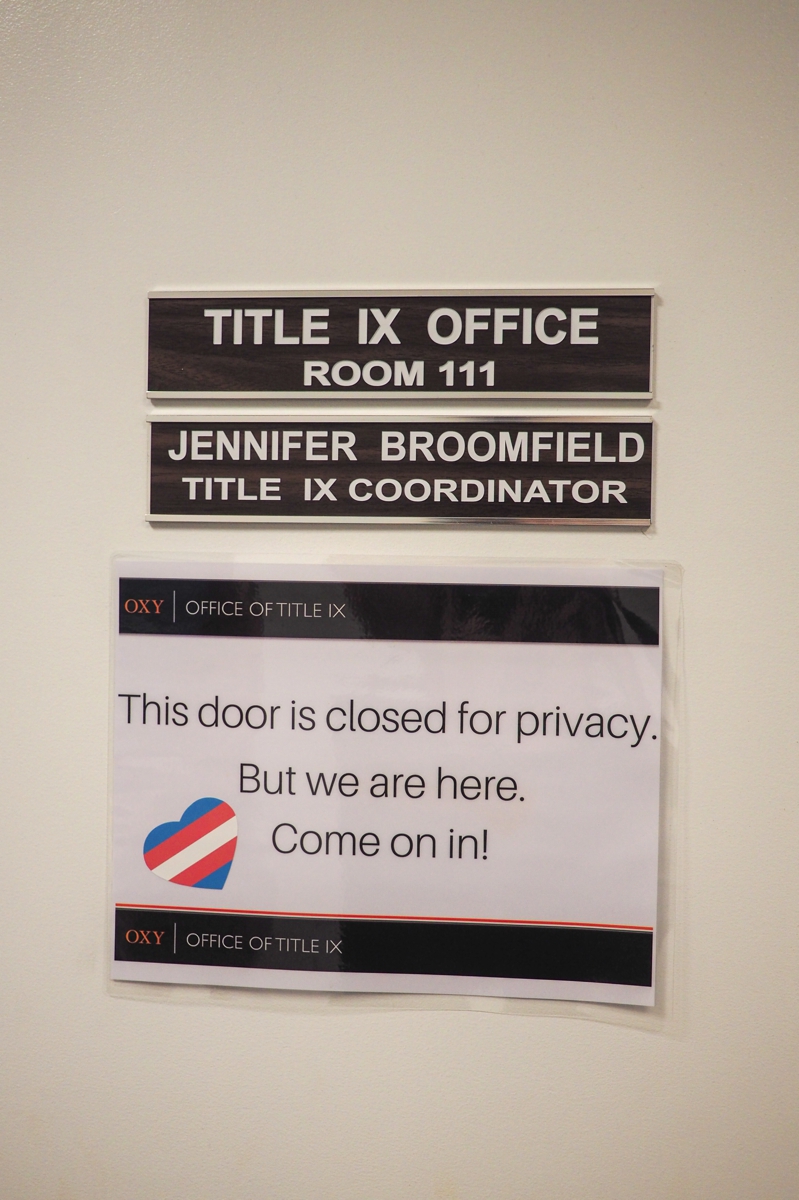
The U.S. Department of Education (DOE) published its new proposed Title IX regulations in the Federal Register Nov. 29, 2018, amending college and university policies for how sexual harassment and sexual assault will be handled under Title IX. The DOE regulations are currently in review and not finalized.
Independently, the California Court of Appeals issued a decision against the University of Southern California (USC) Jan. 8 that made it unlawful for the Title IX process in California to take place without a live hearing for cases where severe discipline is on the table. This ruling effectively replaced the single investigator model — where there is one investigator handling the case without a live hearing — — that Occidental previously employed. According to Title IX Coordinator Jennifer Broomfield, due to this decision, Occidental put into effect its new Interim Sexual Misconduct Policy Jan. 25 in order to comply with California’s ruling.
Broomfield said the Title IX office was planning on waiting until the finalization of the DOE regulations to amend the school policy, and that the interim policy formed as a reaction to California’s ruling against USC.
“As of Jan. 8, anything we did that didn’t comply with California state law would be unlawful,” Broomfield said.
Broomfield said she acknowledged that the college will need to make additional changes once the federal regulations are officially published.
“We tried to be very intentional and only change what we needed to change in order to comply with California, [at] the same time knowing what was coming down from the federal government and trying to make sure whatever we changed here wouldn’t have to be drastically changed [again],” Broomfield said.
According to Broomfield, the majority of the changes took place in Appendix A, which relates to grievances against a student respondent. Appendix B, which concerns staff, faculty and definitions, was not impacted by the California decision.

Broomfield planned to host two information sessions regarding the interim misconduct policy Feb. 12. Both were canceled due to lack of attendance. Broomfield said the Title IX office plans to host more information sessions in March to ensure the community is involved and educated on the updates.
Project SAFE (Sexual Assault Free Environment) Program Assistant (PA) Junko Anderson (sophomore) said the atmosphere in the Project SAFE office has been affected by the proposed regulations.
“I cannot imagine having to confront a perpetrator of violence in that situation, and having to hear that California made it happen before these [regulations] even went through is really disappointing,” Anderson said.
Anderson expressed concern about several aspects of the proposed regulations, including changes to the Title IX timeline. The new regulations would shift the timeline from completing an investigation in 60 days to completing an investigation within a prompt time frame. The DOE has not given an exact definition of ‘prompt.’
“They’re also changing the standard for which the school has been found guilty of not caring enough. The combination of saying ‘You have to do it’ and ‘You can’t ignore it’ is such a weak motivation, so schools will be able to get away with just dragging these processes on,” Anderson said. “Urgency is important, and they’re kind of getting rid of that.”
Anderson said their biggest concern is the change in evidentiary standards and the live hearing process. Because the Title IX process is an administrative process and not a criminal court proceeding, Anderson said there are fewer permitted resources, including a lack of witnesses or forensic evidence, which contradicts the live hearing style.
After the publication of the proposed DOE regulations, a 60-day public comment period began. Both individuals and institutions could comment and critique the proposed regulations during this time. According to Broomfield, during this comment period — which ran from Nov. 29, 2018 until Jan. 30, 2019 — Occidental commented on the proposed regulations via the general counsel’s office.
Project SAFE Senior Manager and Survivor Advocate Marianne Frapwell said she helped draft a comment with the National Professional Organization for Campus-Based Advocates and Preventionists, and she also sponsored several comment-writing events on campus for students.
Beyond institutional commenting, Anderson advocated for access to information on the regulations and student action through individual commenting.
“I would table a couple days a week with different resources that I had either made or found about the new proposed regulations and it was just me doing that,” Anderson said. “It wasn’t paid work, it was just something I cared about.”
Anderson posted “12 days of criticisms” on their personal Facebook as a spin on the “12 days of Christmas” and helped with a resident adviser-sponsored event to encourage people to comment.
“We got five or six people to write a comment in front of us,” Anderson said. “We got to see that we were actually having a direct impact. That was really rewarding.”
Broomfield said final regulations are typically published 30–60 days after the comment period, but it could take longer. During the comment review period, the DOE will read through all comments but is not required to make any changes if it does not want to do so. If the DOE chooses not to make changes that have been consistently proposed, the DOE has to address why those changes were not made in the final publication, according to Broomfield.
“The last time I looked, which, I think, was the morning of the day the [regulations] were due, there was over 89,000 comments,” Broomfield said. “I don’t know if they will be able to do it all in 30–60 days.”
After the publication of the final regulations, there is a period of time given for implementation. Broomfield said she hopes the DOE allows a reasonable amount of time for Occidental to draft a new policy with the Campus Committee on Sexual Responsibility and Misconduct (CCSRM), gather community input through town halls and Q&A sessions, and implement the finalized policy.
“We’ll take that all into consideration, come up with a final draft and then do more information sessions with the final draft,” Broomfield said.
According to Anderson, the Project SAFE office is significantly understaffed, as Frapwell is the only full-time staff member. Due to this, the office is under increasing stress as the federal changes affect their processes and goals. Anderson said despite this pressure, it is important to respect survivors and give them the most possible choices.
“Not everyone is going to take advantage of the Title IX process, and that’s okay, but if the process is there, we gotta make sure it’s a good one,” Anderson said. “The smallest amount of empathy should be able to convince you that this is important.”
Occidental has on-campus confidential resources in place that can be found on the Title IX website.
![]()






























